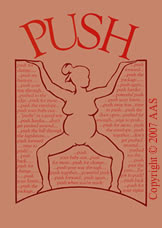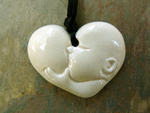The obstetrician for the first mother was the only provider in an HMO serving a major bank corporation in Phoenix, Arizona. No other options were discussed for the breech presentation. Not one known technique for turning a breech baby was offered to the mother.
Look at the pictures with new eyes -- eyes for the experience of the birthing baby whose brain IS RECORDING every second of life. Who can determine the definitive time in an infant’s or child’s life when one starts to remember? Can you really dare to look at these pictures and really see the pain of this baby as the neonatalogist (big musclely arms) holds him high in the air? There is a bit of smile in the doctor’s eyes? How can this
 be? Does he not see the terror and anguish of this child as he is held high in a cold, noisy, bright surgical suite? I notice this a lot -- a thrashing, crying baby and parents and caregivers smiling. Can you dare to really see it and feel it yourself?
be? Does he not see the terror and anguish of this child as he is held high in a cold, noisy, bright surgical suite? I notice this a lot -- a thrashing, crying baby and parents and caregivers smiling. Can you dare to really see it and feel it yourself?Do you really think this baby has no emotional response to this birth and can’t remember, while you looking at them will have an emotional response?? Does the doctor not think about what this baby’s only need--to be in his mother’s arms? Why does the scientific medical community not remember that the amgydala of the brain is the part of the brain that is “online” in this moment, and that we know scientifically that this baby’s brain is organizing memory around this experience?
Can anyone determine the definitive time in an infant’s or child’s life when one starts to remember? Does your newborn not remember the joy and love of her birth or early infancy or toddlerhood -- if not, why bother? Can you really dare to look at these pictures and really see the pain of this baby as the physician holds him high in the air? There is a bit of smile in the doctor’s eyes? How can this be? Does he not see the terror and anguish of this child as he is held high in a cold, noisy, bright surgical suite? Can you dare to really see it and feel it yourself?
Do you really think this baby has no emotional response to this birth and can’t remember the experience even though he has not yet put words to experience? Even though, while you looking at them you will have an emotional response and the words? He has only his body and cries to communicate. Society does not listen. Does the doctor not think about what this baby’s only need--to be in his mother’s arms?
For weeks and months before his birth this baby’s mom and dad were likely singing and playing music to him as many parents now do. Why is it that most of us in our society easily accept that babies will somehow selectively “remember” these joyful and loving womb experiences; but not the painful and terrifying? How can a reputable teacher, psychologist, nurse, or physician say that this child will not ALSO reme
 mber this obviously horrific birth experience and the experience of being separated from his mother?
mber this obviously horrific birth experience and the experience of being separated from his mother?Look at the ointment in the baby’s eyes as he lies in the bassinet. Any adult who has had surgery can attest to the emotion ranging from panic, to fear, to terror this creates. This newborn has not yet been held by his mother -- the one whose voice he knows as himself. They will not get to gaze in each other’s eyes; nor will he for several days now, because of the ointment. The immediate eye contact at birth is nature’s way of triggering a cascade of hormones that will facilitate nursing and bonding. Instead of being in his mother's arms and experiencing her touch that is loving as only a mother's can be, he is alone in a bassinet while his mother is being cared for on another floor. He has been scrubbed, weighed, his spine stretched to measure his height, and he has been given shots....all without warning and permission, and all within moments of his new experience of life outside the womb, all under bright lights with strangers in a noisy room. His senses are bombarded. He has experienced "torture" before he has been with his mother. She is medicated, unable to fully feel. His father, who in any other situation, would be a protective lion father, has been rendered powerless by the medical enviornment. He did manage to throw a fit to have his son reunited with his mother who was on the regular surgical recovery floor because there was no room in labor and delivery (and it was planned. Isn't that like having a reservation and not getting to go in?)
Imagine this as your first experience of the world. How does a society do this to it's young without the acknowledgement of the long term effects. How could we not see modern medical birth as the source of children's medical, social, and psychological dynamics? This little boy was literally terrified to be with anyone but his mother, father, and grandparents -- all the way up until early elementary years. Leaving his mother to go into a new enviornment FEELS like the first experience with her because it was the first exeprience and everything else is "filtered" through that
 experience.
experience.It is scientifically known that eye contact between mother and baby within minutes and for the first hour of life is absolutely crucial for healthy attachment. Hospitals continue, nonetheless, to put this ointment (not drops that drain away, it is OINTMENT) in a newborns eye before he sees his mother which leads to hormone release in both of them. This is the essential element necessary for him to be able to self-attach to his mother’s breast. Look at the pain on the face of the mother as she looks at her baby. We do not see signs of oxytocin and endorphins in the relationship between mother and baby. This baby was unable to let his mother out of his sight for the first four years of his life, even with grandparents and aunts and uncles. He is five years old now, and as is often the case with children born by c-section, he is extremely active and verbally articulate.
Tell me again that birth doesn’t create the earliest experience in our physical lives and that babies don’t remember. And, I’ll say, LOOK at the pictures again. Look at your own, your children’s, your grandchildren’s with new eyes.
Look at the ones below of a mom and baby who birthed at home with HomeFirst in Chicago. Mother said the first picture was taken minutes before the birth. Not exactly our America television drama and trauma birth, eh? Her legs aren't being forced up to her ears into the worst possible position, there is not an emergency team of medical people scrambling around telling her what to do and how to do it -- "PUSH.. PUUUUSH! PUUUSSH... PUUUSSH." (Is it a
 ny wonder we have the problems we do with children pushing, pushing, pushing every boundry at home, school, and in society?)
ny wonder we have the problems we do with children pushing, pushing, pushing every boundry at home, school, and in society?)This baby was first touched by his mom and did the self-attachment sequence described on this site. Mother's first touch is critical because it is loving and gentle -- no one can touch a baby like a mother or father does. Self-attaching at the breast completes a biologically programmed completion in the baby's brain.
As for the end of D-----s birth... I think about it all the time, because it was so awesome. It gives me chills every time and warm fuzzies...which sound like opposites, but you know they are not!
He started pushing his head out of me while I was on my side, so he instigated the pushing process. I quickly turned over and told the nurse I had to push right then. (as he was already coming out on his own!) Once I started pushing, his head came out on the first contraction. Everyone was so excited! The nurse asked if my contraction was done and I said yes, so she said to stop pushing... one of my prayer requests had been that I would have the self-control to stop pushing between contractions during D-----'s birth, b/c during M---s' I did not have that control. I did stop pushing... relaxed for a moment... and HERE IS THE BEST PART... I reached down and touched his head! Oooh! That is the part I keep running over and over in my mind. I cannot ever express the immensity of feelings that welled up in me at that moment. We were still together, one unit, and yet I was touching him.... it was INCREDIBLE. It felt like minutes, but I'm told it was probably less than 30 seconds, and the next contraction came on. His torso came out. The nurse stopped him for just a second to push down the umbilical cord, and then a tiny push sent out his big old feet. :) (My boys DO have big feet. And they stink from day one. What can I say? Testosterone.)
So that was the pushing process. The nurse instantly scooped him up upon his exit from the womb an
 d laid him on my tummy. Oh so cute! We just lay there together after that, and I just watched him. My sister wanted me to get him latched on to my breast, but I remembered on your website something about letting a newborn find the breast on their own. So I opted to wait for him. I don't know how long we laid there, probably 10-15 minutes or so,and then he started wriggling and rooting. He wriggled and rooted all the way up to my nipple, all on his own. And he nursed! And that was that! I was elated that he had found it himself... and a bit surprised!
d laid him on my tummy. Oh so cute! We just lay there together after that, and I just watched him. My sister wanted me to get him latched on to my breast, but I remembered on your website something about letting a newborn find the breast on their own. So I opted to wait for him. I don't know how long we laid there, probably 10-15 minutes or so,and then he started wriggling and rooting. He wriggled and rooted all the way up to my nipple, all on his own. And he nursed! And that was that! I was elated that he had found it himself... and a bit surprised!








1 comment:
Amazing! I really like your blog. Thanks for all the terrific info.
Post a Comment